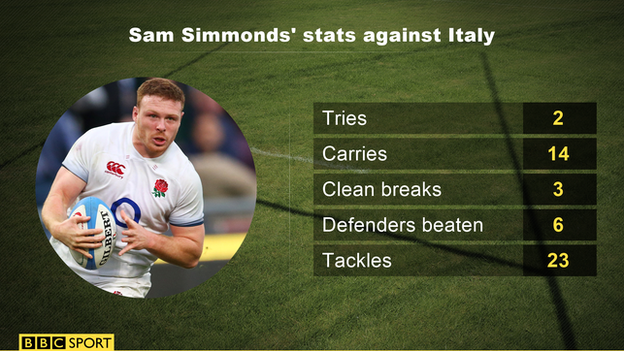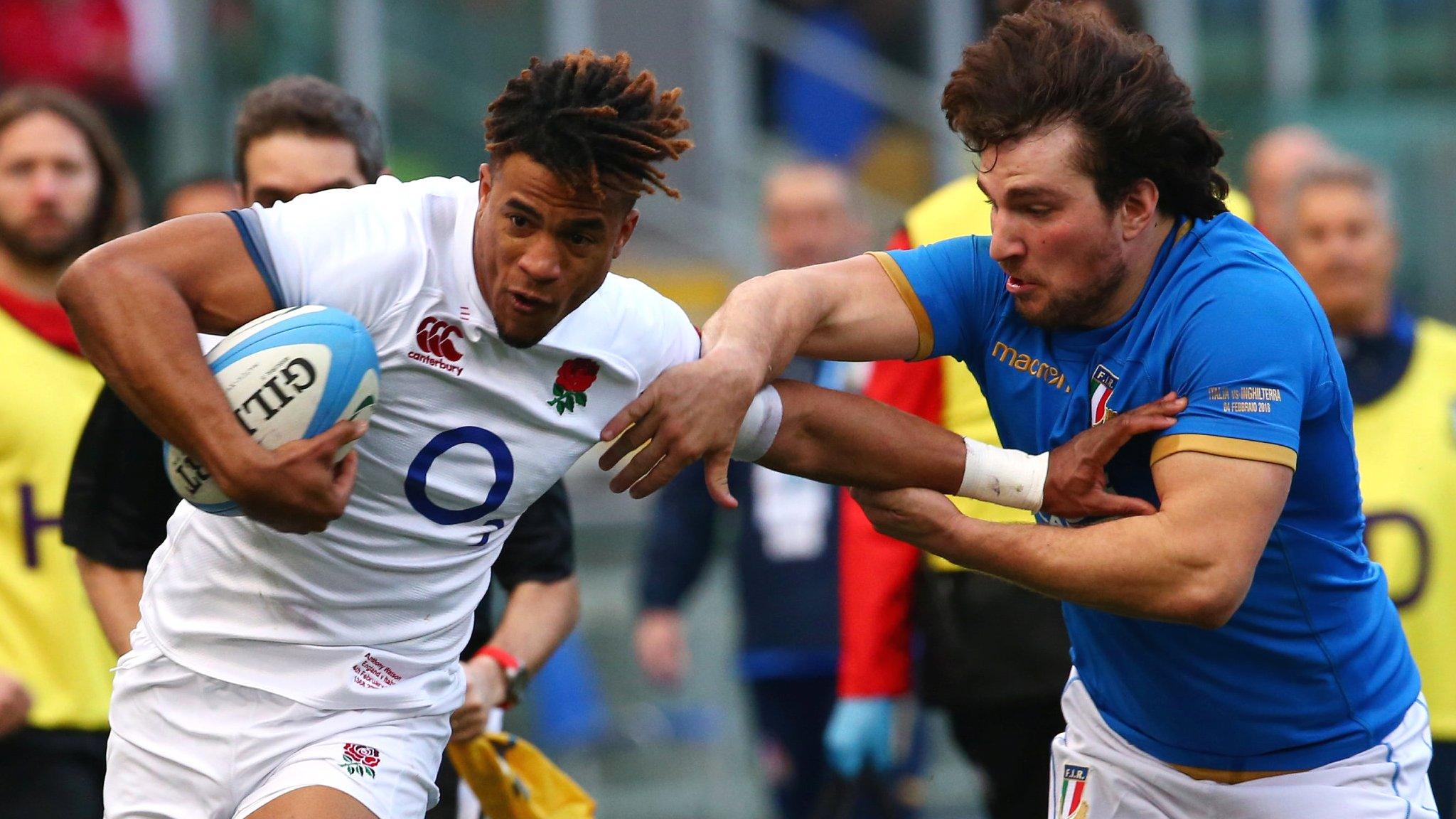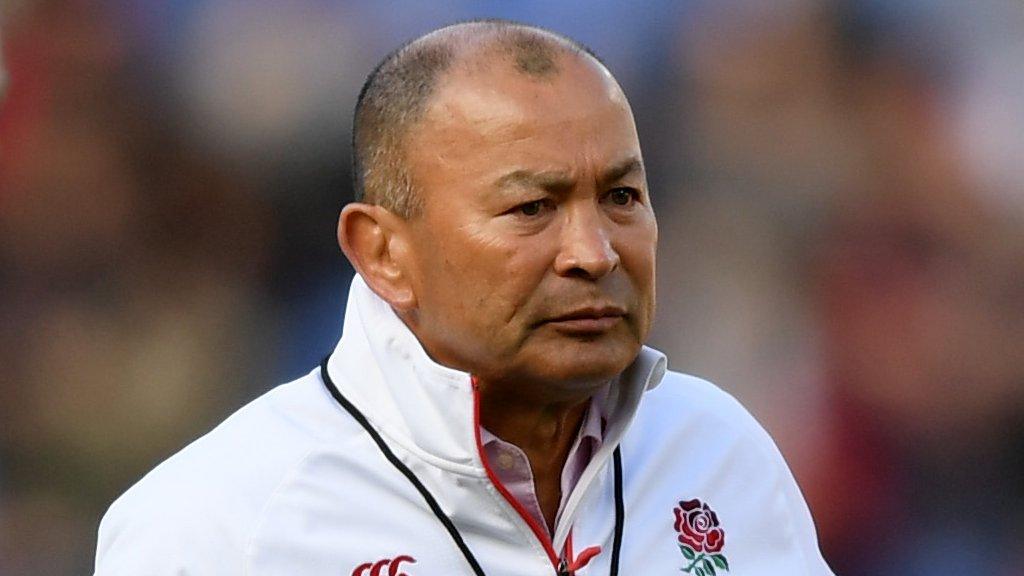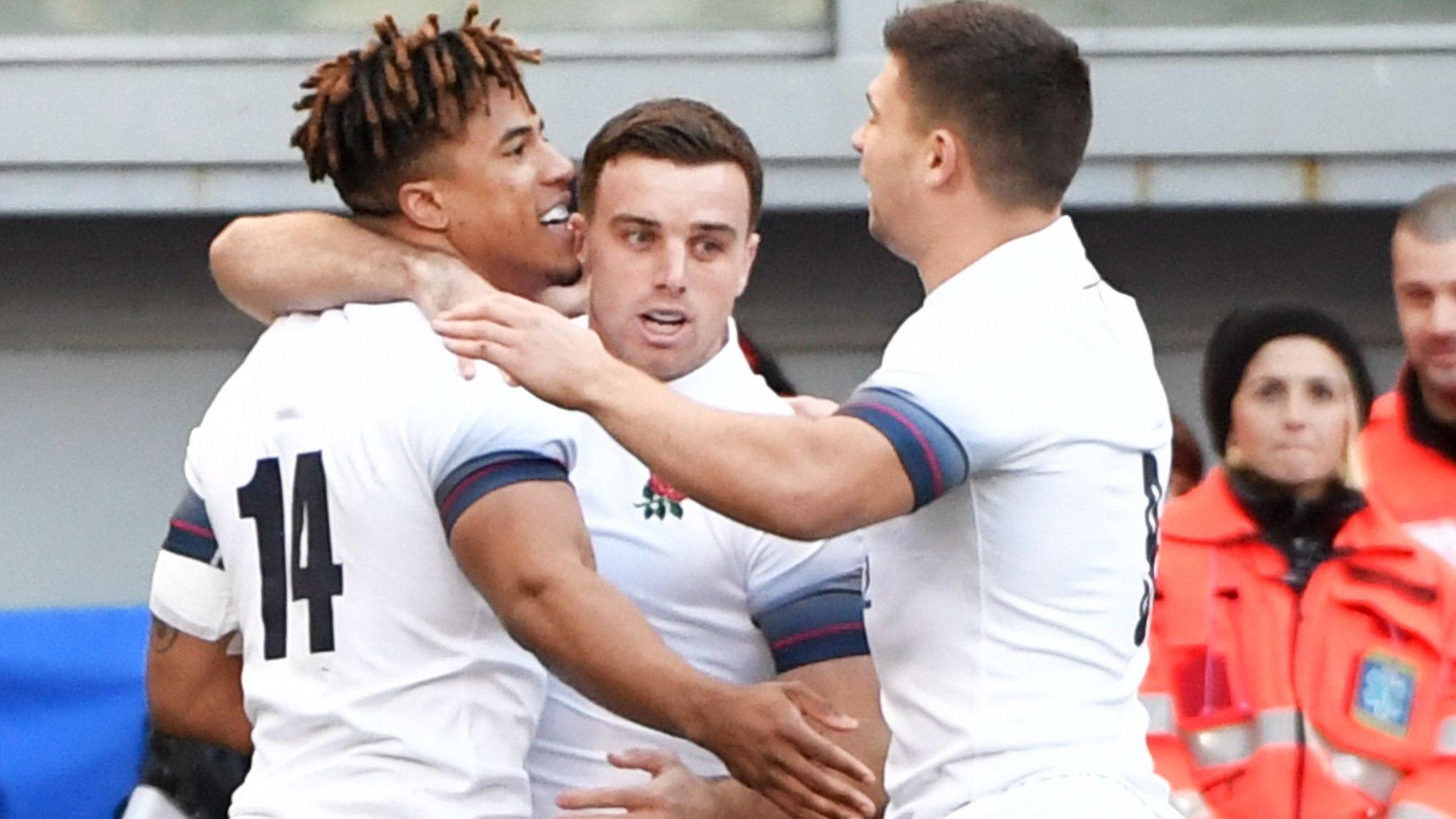England 46-15 Italy: Ford and Farrell take partnership to new heights
- Published
- comments
You learn very little when England play Italy, goes the accepted wisdom - 23 matches between the two before this weekend, 23 wins for the men in white.
A 24th victory should offer little more - 46-15, the sort of margin this fixture routinely throws up. Except on a clear-blue Sunday in Rome there was enough that was different and much that was better than before.
No-one had doubted the bond between George Ford and Owen Farrell: childhood friends turned England age-group team-mates and then strolling together on the international stage, never overawed, always pushing each other on, at their best in harmony.
But there have been a few questions - about Ford's club form, over whether he has been playing too deep and static for his national side in the past 12 months, whether Eddie Jones might one day give primacy to Farrell in the fly-half's jersey and look for muscle outside rather than a second receiver.
The talk before this match had been of Ben Te'o and the missing punch he might bring to an England midfield that can sometimes get a little sideways.
And so answers came fast and early and flat and late. Two tries for Anthony Watson while the crowd was still settling, both of them created by Ford and Farrell working a wrap-around so smoothly that they might have been back on the street in Harpenden where they matured as teenage neighbours, delaying the maternal summons for tea until they had made 20 perfect passes.
A comeback from Italy, a riposte from the two once again: a call to the blindside from Farrell, Ford flat to the line, the pass outside him putting his friend through a hole to give England a cushion once again. Late in the game, Ford finding Farrell once more, the bigger and elder of the two crashing through, the smaller and faster there to gather his inside pass and dive over for a try of his own.
There is understanding between a 10 and a 12 and then there is what these two have at their best; a telepathy that can only come from more than time spent together in international weeks.
It is trust in the other's ability and it is a deep knowledge of where they will be when. It is a decision made instinctively rather than one that has been dictated from the outside, an opening found in the tiny fractions of a second that the game at this level allows.
It is not new. On YouTube you can find footage from 2009 of the two doing the same for England Under-18s, at a half-empty Kingston Park in Newcastle, Ford aged 16, Farrell 17.
Neither has it necessarily peaked. Farrell is 26, Ford not 25 until mid-March. While Farrell was uncharacteristically fallible with the boot in the Stadio Olympico, he continued to show an alacrity with ball in hand, whether stepping through gaps or timing his offload or pass, that wasn't always there a few years ago. Ford took the ball flat and still had time. It was Te'o who was replaced before the hour, the two friends who went the distance.
You might ordinarily throw in the caveat that this was only Italy, that the same space and time will not be there against a Welsh defence marshalled by Shaun Edwards at Twickenham next weekend.
Yet this was not the same old Azzurri of recent and long-term memory - attritional and obdurate, full of heart but short of fitness and guile.
There was ambition in the backs and the ability to make it pay. In Matteo Minozzi and Mattia Bellini there was youthful threat and a promise for the future. Tommaso Allan had his best game yet at fly-half, Tommaso Boni outside him providing the pace and power to exploit it.
There were morale-sapping flaws. They missed 25 tackles, 11 of them in the first 35 minutes. There was also parity elsewhere, in territory and possession, even if the scoreboard was once again lopsided.
There were two fine tries and another denied on replay by a tight forward pass. Coach Conor O'Shea said afterwards he felt both proud and angry, disappointed by what he saw as inconsistency from referee Mathieu Raynal even as he saw evidence of clear improvement from his perennial also-rans.
So it was Eddie Jones who finished with his trademark grin in place, delighted with a scrum that he declared as good as anything he has seen as England coach, happy that with the line-out solid too he has a set-piece that can form, as he wants, the foundation for everything the team does.
A year ago his side took control of games in the final quarter, their replacements riding to the rescue against Italy, Wales and France. On Sunday his starters were as his finishers then, and his finishers as effective as they have always been. Two tries in those first 11 minutes, three more in the last 12.
England were supposed to miss the bulldozing and ball-carrying of the injured Billy Vunipola. Instead they profited from the contrasting skills of Sam Simmonds, the number eight refashioned as a muscular centre with speed and a step.
Nowell 'jigsaw-ish' in substantial England win - Eddie Jones
On his Six Nations debut, the Exeter man carried for 80 metres, more than any team-mate, made 14 carries, 23 tackles, beat six defenders and made three clean breaks. His two tries made him only the third England forward in history to bag a brace in the same match. Not bad for a stand-in, for a player Jones has constantly nagged to stick on weight and grunt.
Simmonds gives up two inches and four stone to Vunipola. When Big Billy returns from injury, Simmonds may find that he fits into seven as easily as he does eight. Until that point he offers a different kind of threat and a new sort of thrill for England's buoyant support.
"If he was a cricketer he'd play Twenty20," purred Jones afterwards. "Life's full of contradictions and he's one of them. Fast, elusive, good."
New stars, fresh lessons. And an old axis that keeps getting tighter and slicker yet.

Number eight Sam Simmonds marked his Six Nations debut with a superb display. He led or jointly-led England in six categories on Sunday
- Published4 February 2018

- Published4 February 2018

- Published4 February 2018
